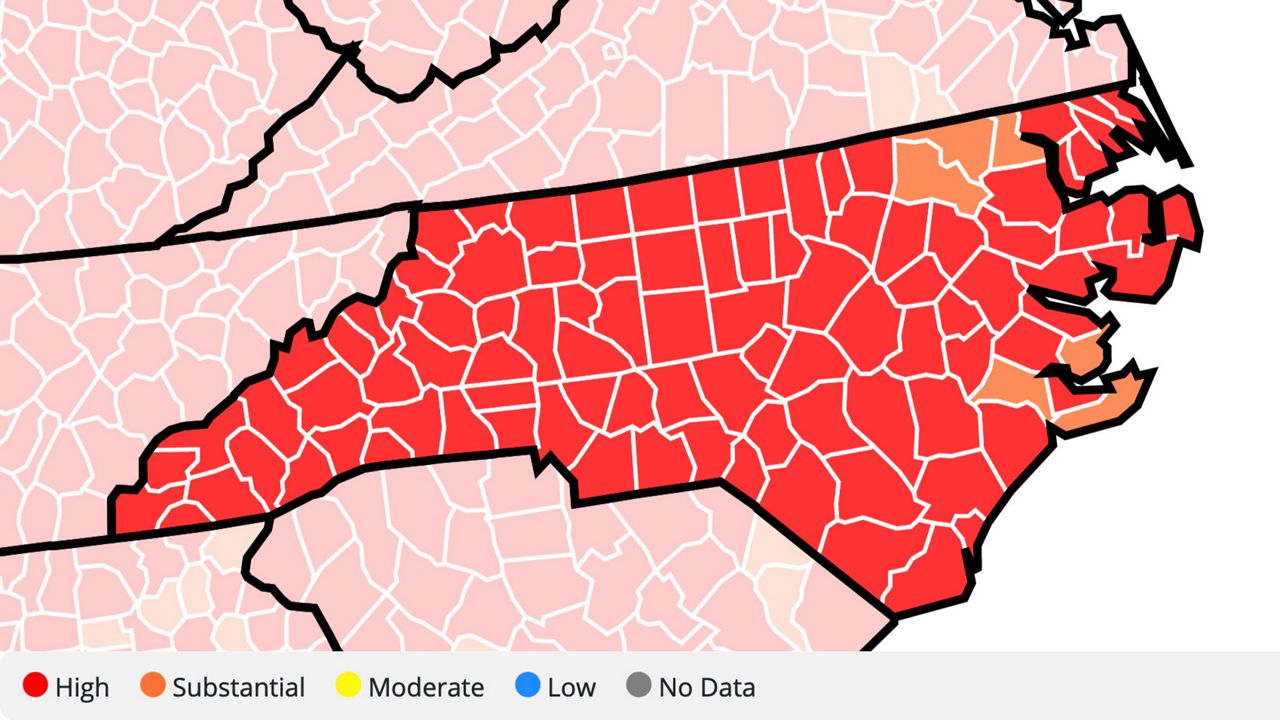Almost every county in North Carolina is back in the “red zone” for coronavirus risk after things had been looking better last month and the state's first case of the omicron variant was announced in Mecklenburg County Friday afternoon.
All but six counties in eastern North Carolina are back to seeing high levels of community transmission, according to the Centers for Disease Control and Prevention. In mid-November, more than half the counties in the state had dropped to the CDC’s orange or yellow zones, meaning fewer people were getting the virus.
“We have seen a significant rise in two of the important transmission metrics we watch to determine where things stand in our community – new cases over the last two weeks and the percent of positive test results,” New Hanover County Health Director David Howard said in a statement this week.
“Because these numbers have risen again, our county has moved up from moderate transmission to substantial transmission, according to the CDC. Widespread use of safety measures, in particular becoming vaccinated, can control the pace of transmission and the number of people who become seriously ill. If everyone pitches in as much as they can, everyone wins,” he said.
Coronavirus case rates have been increasing in recent weeks across North Carolina and around the country. Public health officials here say the increases are still from the delta variant, not the new omicron variant.
“This increase began before the Thanksgiving holiday, but recent increases are likely being driven in part by spread during holiday gatherings and travel. Increases have been seen in all age groups but case rates (number of cases per population) and test positivity (percent of PCR tests that are positive) are highest in children and young adults,” a spokeswoman for the North Carolina Department of Health and Human Services told Spectrum News 1.
“As we enter the colder weather and holiday season when people spend more time indoors, diseases may be able to spread more easily,” she said in an email.
State public health officials say they expected to see some increases with colder weather and holiday gatherings.
On Thursday, the state reported more than 4,000 cases for the day, the highest daily total in about two months. The number of people hospitalized with the coronavirus is also up, with almost 1,500 people in the hospital with COVID-19, according to DHHS data.
Public health officials at all levels say getting vaccinated, and getting a booster shot, is the best way to stay safe against COVID-19.
Vaccines are now available to anyone 5 and older.
Federal regulators this week approved booster shots of the Pfizer vaccine for 16- and 17-year-olds. Boosters were already available for anyone 18 and older who got their last shot more than 6 months ago.
"Getting your teen a COVID-19 booster shot will help strengthen and extend their protection against the COVID-19 virus and especially from new variants," DHHS Secretary Dr. Mandy Cohen said in a statement. "I encourage everyone ages 16 and older to get their booster as we head into the holiday season."
About 63% of North Carolina’s population has gotten at least one vaccine shot, according to DHHS, and 73% of adults in the state have gotten at least one shot.
There are still a lot of questions about how the vaccine will work against the new omicron variant that is showing up in more states around the country. But doctors and public health officials say almost all cases in North Carolina are from the delta variant.
“Although we don’t have all the answers on the Omicron variant, initial data suggests that COVID-19 boosters help broaden and strengthen the protection against Omicron and other variants,” CDC DIrector Dr. Rochelle Walensky said this week.
The new omicron variant, first detected in South Africa last month, was found in Mecklenburg County, officials said Friday afternoon. The case was identified in a UNC Charlotte student, who was isolated and has recovered, the county said in a news release.
It is the first case of the omicron variant detected in North Carolina.
Mecklenburg County Public Health scheduled a news conference for Friday afternoon.
Elsewhere, the Virginia Department of Health reported the first case in the commonwealth Thursday.
“We knew it was only a matter of time before we would record our first Omicron infection,” Virginia State Health Commissioner Dr. Norman Oliver said Thursday. “This drives home the challenge the COVID-19 virus presents to the world as the virus changes and mutates over time.”
He said the case was in an adult in northwest Virginia who had recently traveled in the United States.
Omicron appears to spread more easily, but it’s still not clear if it causes more severe symptoms than delta, according to the CDC.
“Current vaccines are expected to protect against severe illness, hospitalizations, and deaths due to infection with the Omicron variant. However, breakthrough infections in people who are fully vaccinated are likely to occur,” the CDC said.



